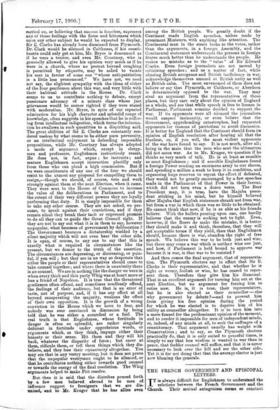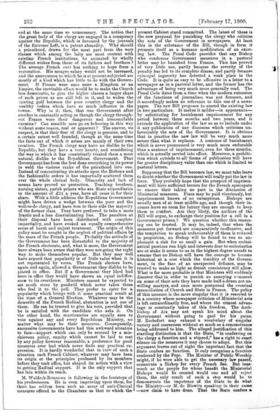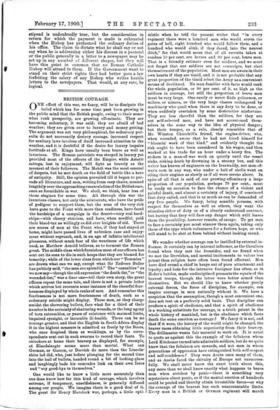THE FRENCH GOVERNMENT AND EPISCOPAL LETTERS.
IT is always difficult for Englishmen to understand the relations between the French Government and the Church. Their mutual antagonism seems so constant and at the same time so unnecessary. The notion that the great body of the clergy are engaged in a conspiracy against the Republic, which is favoured by the journals of the Extreme Left, is a patent absurdity. Why should a priesthood, drawn for the most part from the very classes which among the laity are most content with existing French institutions, be animated by wholly different wishes from those of its fathers and brothers ? The average French cure has nothing to hope from a restoration. His meagre salary would not be increased, and the annoyances to which he is at present subjected are mostly of a kind which has little to do with the Govern- ment. If France were once more a Kingdom or an Empire, the inevitable effect would be to make the Church less democratic, to give the higher classes a larger share of such prizes as are still left in it, and to widen the ?xisting gulf between the poor country clergy and the wealthy orders which have so much influence in the towns. Why is it, then, that one Government after another is constantly acting as though the clergy through- out France were their dangerous and irreconcilable enemies Can sensible men go on behaving in this way without some reason, real or apparent ? The answer, we suspect, is that their fear of the clergy is genuine, and to a certain extent well founded, though at the same time the facts out of which it arises are mainly of their own creation. The French clergy may have no dislike to the Republic, but they have a very hearty, and considering the way in which it has consistently treated them a most natural, dislike to the Republican Government. That Government has from the first done everything in its power to weld the various ranks of the priesthood into one. Instead of concentrating its attacks upon the Bishops and the fashionable orders it has impartially scattered them over the whole clerical body. Obscurity and lack of means have proved no protection. Teaching brothers, nursing sisters, parish priests who are State stipendiaries to the amount of £24 a year, have all come in for their share. With a little address the Republican Government might have driven a wedge between the poor and the well-to-do clergy, and have won to their side the majority of the former class. They have preferred to take a more lrastic and a less discriminating line. The penalties at their disposal have been distributed with complete impartiality, and have evoked an equally comprehensive sense of harsh and unjust treatment. The origin of this policy must be sought in the neglect of political affairs by the mass of the French people. Probably the attitude of the Government has been distasteful to the majority of the French electorate, and, what is more, the Government have always been aware that they were not going the right way to make themselves popular. But they may well have argued that popularity is of little value when it is not represented by votes. The French electors have, again and again, allowed a Government they dislike to be placed in office. But if a Government they liked had been in office they would have shown an equal indiffer- ence to its overthrow. Ministers cannot be expected to set much store by goodwill which never takes those who feel it to the poll. They prefer to cater for a popularity which brings with it some practical result at the time of a General Election. Whatever may be the demerits of the French Radical, abstention is not one of them. He can be trusted to give his vote, provided that he is satisfied with the candidate who asks it. On the other hand, the reactionaries are equally sure to vote against any and every Republican Ministry, no matter what may be their measures. Consequently, successive Governments have had this awkward situation to face—support which can only be secured by a mis- chievous policy, enmity which cannot be laid to rest by any policy however reasonable, a preference for good measures over bad which never finds any practical ex- pression. It is hardly wonderful that in view of such a situation each French Cabinet, whatever may have been its origin or the principles professed by its members before they took office, has shaped its action with a view to getting Radical support. It is the only support that has lain within its reach.
M. Waldeck-Rousseau is following in the footsteps of his predecessors. He is even improving upon them, for there has seldom been such an array of anti-Clerical measures offered to the Chambers as that to which the present Cabinet stand committed. The latest of these is the new proposal for punishing the clergy who criticise the acts of the Government in newspapers. At least this is the substance of the Bill, though in form it presents itself as a humane modification of an exist- ing law. The Penal Code provides that any Bishop who condemns Government measures in a pastoral letter may be banished from France. This has proved of very little use, partly because the severity of the penalty has led to its complete disuse, and partly because episcopal ingenuity has detected a weak place in the Code. It is quite as easy to be offensive in a, letter to a newspaper as in a pastoral letter, and the former has the advantage of being very much more generally read. The Penal Code dates from a time when the modern extension of the functions of journalism was not foreseen, and it accordingly makes no reference to this use of a news- paper. The new Bill proposes to amend the existing law in two particulars. It makes it milder—in appearance— by substituting for banishment imprisonment for any period between three months and two years and it extends the application of the law so as to include under it any publication of any discourse which criticises un- favourably the acts of the Government. It is obvious that in practice the new law will be very much more severe than what it replaces. A sentence of banishment which is never pronounced is very much more endurable than a sentence of imprisonment, even for three months, which is actually carried into effect. Moreover, a prohibi- tion which extends to all forms of publication will have far greater disciplinary value than one which is limited to pastoral letters.
Supposing that the Bill becomes law, we must take leave to doubt whether the Government will really put the law in force. They probably hope that the prospect of imprison- ment will have sufficient terrors for the French episcopate to ensure their taking no part in the discussion of Ministerial measures. Fines may be paid vicariously, but imprisonment knows of no exemptions. Bishops are usually men of at least middle age, and though their in- comes leave no room for luxury they are enough to keep them in comfort. Are they likely, the authors of the Bill will argue, to exchange their position for a cell in a Government prison ? We question whether this reason- ing can be trusted. It may be, indeed, that when the measures put forward are comparatively inoffensive, and the temptation to speak unfavourably of them is reduced in proportion, no Bishop will be found to run so un- pleasant a risk for so small a gain. But when ecclesi- astical passions run high and interests dear to ecclesiastics are at stake it seems to us in the highest degree unsafe to assume that no Bishop will have the courage to become historical at a cost which the timidity of the Govern- ment, in the face of an unexpected defiance, may be trusted to make as light as decent consistency will allow. What is far more probable is that Ministers will suddenly discover that in order to punish an annoying comment on some of their acts they have made half-a-dozen not un- willing martyrs, and once more postponed the eventual reconciliation of Church and State in France. The policy of this measure is the more singular that it is resorted to in a country where newspaper criticism of Ministerial acts is left extraordinarily free, and where the utmost advan- tage is constantly taken of this freedom. The Arch- bishop of Aix may not speak his mind about the Government without going to gaol for his pains. M. Rochefort may exhaust a vocabulary of singular variety and coarseness without so much as a remonstrance being addressed to him. The alleged justification of this startling distinction is that the State, "in conferring on the clergy a function and a stipend," has a right to exact silence on the measures it may choose to adopt. But this argument leaves out of sight the important fact that the State confers no function. It only recognises a function conferred by the Pope. The Minister of Public Worship might, if he were able to get the necessary law passed, consecrate a Bishop for every French See. But inas- much as the people for whose benefit the Ministerial Bishops would be created would one and all reject them, the only result of such a step would be to demonstrate the impotence of the State to do what the Ministry—or M. de Blowitz speaking in their name —now claim to have done. That the State confers a,
stipend is undoubtedly true, but the consideration in return for which the payment is made is exhausted when the Bishop has performed the ordinary duties of his office. The claim to dictate what he shall say or not say when he is addressing either his diocese in a pastoral or the public generally in a letter to a newspaper may be set up in any number of different shapes, but they will have this point in common that no Roman Catholic Bishop will attend to them. If the Government want to stand on their strict rights they had better pass a law forfeiting the salary of any Bishop who writes hostile letters to the newspapers. That would, at any rate, be logical.








































 Previous page
Previous page